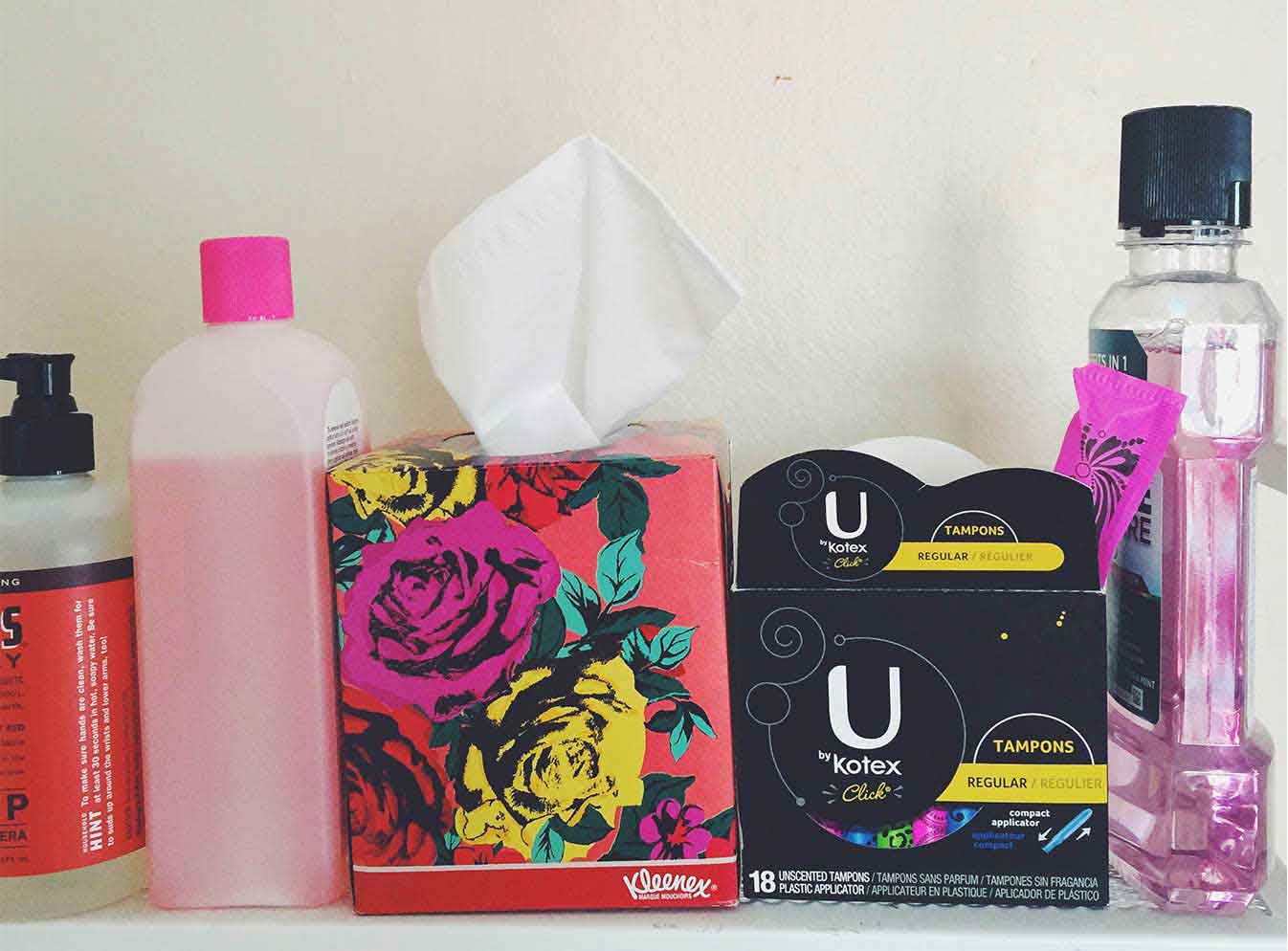Vaginal Health: What's Normal? What Isn't?
Learn more about why vaginal and reproductive health is just as important as any other aspect of your physical wellness.
Most likely, you know how to take care of your hair, your skin and your appearance. Though do you know how to care for other parts of your body, even if they’re not as visible? Caring for your reproductive health is important for your overall health and, in particular, for your fertility and to ensure a fulfilling sex life over the long term.
The vagina is the internal muscular canal that goes from the uterus inside your body to the vulva, which is the end of the canal and the outer part of your genital area. (Many women confuse the vagina with the vulva.) If you've gone through puberty, you’ve probably grown accustomed to the changes in your body, especially those that occur during your menstrual cycle like bleeding and vaginal discharge varying in intensity, color and texture as the month goes on.
Both vaginal bleeding during your period (as long as it not excessively heavy or irregular) and discharge are normal. The latter will be more abundant during ovulation, which occurs at about the mid-point of your cycle. Again, it is perfectly normal as long as it doesn’t change color suddenly, doesn’t have an unusual odor, and isn’t accompanied by itching, burning, pain, or fever, which are symptoms that suggest you could have an infection, either bacterial or fungal.
Young women may also experience significant amounts of liquid discharge due to the rise in hormone levels during this time of life, particularly if you are taking birth control pills to regulate your period or to avoid pregnancy if you are having sex. This type of discharge is also normal.
Of course, you want to feel clean and fresh. You may think it makes sense to use special soaps, vaginal douches, or vaginal deodorants. But, believe it or not, your vagina is perfectly capable of cleaning itself. Your vagina needs to maintain its acidity level within a specific range (pH 3.5 to 4.5) in order to prevent the growth of harmful bacteria and to stimulate the development of good bacteria. On the other hand, you should keep your vulva, the external part, as clean as possible, especially during your period. Change your tampon or sanitary napkin frequently. Use water and a very mild soap that you rinse off thoroughly. Avoid using douches and deodorants as they may irritate the area.
There are some signals that you should note as they indicate that something is not right. Among them are:
• Changes in your normal vaginal discharge, including a change of color (for example, if your discharge turns yellowish) or texture (if it becomes like cottage cheese), or if it acquires a strong, unpleasant odor, especially if any of these changes are accompanied by fever
• Bleeding between menstrual cycles
• Any lump you feel in your genital area
• A feeling of pressure or heaviness in the vagina.
It’s very important that you see a health professional, preferably a gynecologist, when any of the above symptoms or signs appears. Although there are effective ways to treat fungal infections with over-the-counter products, it is advisable to have your doctor determine exactly what type of infection you have and the best way to control it. Ask him or her any questions you might have. And if you’re already sexually active, be sure you know how to protect yourself from unwanted pregnancy and sexually transmitted diseases (STDs). While some STDs are minor, others can affect your health, your future ability to conceive, and can even endanger your life.
Your vaginal and reproductive health is just as important as any other aspect of your physical wellness. Don’t let any potential embarrassment get in the way of finding the information you need to protect it.
Sources:
http://www.mayoclinic.org/vagina/art-20046562?pg=2
http://www.everydayhealth.com/sexual-health/vaginal-health.aspx
http://www.wikihow.com/Have-a-Healthy-Vagina
http://www.everydayhealth.com/womens-health-pictures/hygiene-rules-for-a-healthy-vagina.aspx#/slide-1
Most likely, you know how to take care of your hair, your skin and your appearance. Though do you know how to care for other parts of your body, even if they’re not as visible? Caring for your reproductive health is important for your overall health and, in particular, for your fertility and to ensure a fulfilling sex life over the long term.The vagina is the internal muscular canal that goes from the uterus inside your body to the vulva, which is the end of the canal and the outer part of your genital area. (Many women confuse the vagina with the vulva.) If you've gone through puberty, you’ve probably grown accustomed to the changes in your body, especially those that occur during your menstrual cycle like bleeding and vaginal discharge varying in intensity, color and texture as the month goes on.Both vaginal bleeding during your period (as long as it not excessively heavy or irregular) and discharge are normal. The latter will be more abundant during ovulation, which occurs at about the mid-point of your cycle. Again, it is perfectly normal as long as it doesn’t change color suddenly, doesn’t have an unusual odor, and isn’t accompanied by itching, burning, pain, or fever, which are symptoms that suggest you could have an infection, either bacterial or fungal.Young women may also experience significant amounts of liquid discharge due to the rise in hormone levels during this time of life, particularly if you are taking birth control pills to regulate your period or to avoid pregnancy if you are having sex. This type of discharge is also normal.Of course, you want to feel clean and fresh. You may think it makes sense to use special soaps, vaginal douches, or vaginal deodorants. But, believe it or not, your vagina is perfectly capable of cleaning itself. Your vagina needs to maintain its acidity level within a specific range (pH 3.5 to 4.5) in order to prevent the growth of harmful bacteria and to stimulate the development of good bacteria. On the other hand, you should keep your vulva, the external part, as clean as possible, especially during your period. Change your tampon or sanitary napkin frequently. Use water and a very mild soap that you rinse off thoroughly. Avoid using douches and deodorants as they may irritate the area.There are some signals that you should note as they indicate that something is not right. Among them are:• Changes in your normal vaginal discharge, including a change of color (for example, if your discharge turns yellowish) or texture (if it becomes like cottage cheese), or if it acquires a strong, unpleasant odor, especially if any of these changes are accompanied by fever• Bleeding between menstrual cycles• Any lump you feel in your genital area• A feeling of pressure or heaviness in the vagina.It’s very important that you see a health professional, preferably a gynecologist, when any of the above symptoms or signs appears. Although there are effective ways to treat fungal infections with over-the-counter products, it is advisable to have your doctor determine exactly what type of infection you have and the best way to control it. Ask him or her any questions you might have. And if you’re already sexually active, be sure you know how to protect yourself from unwanted pregnancy and sexually transmitted diseases (STDs). While some STDs are minor, others can affect your health, your future ability to conceive, and can even endanger your life. Your vaginal and reproductive health is just as important as any other aspect of your physical wellness. Don’t let any potential embarrassment get in the way of finding the information you need to protect it. Sources:http://www.mayoclinic.org/vagina/art-20046562?pg=2http://www.wikihow.com/Have-a-Healthy-Vaginahttp://www.everydayhealth.com/womens-health-pictures/hygiene-rules-for-a-healthy-vagina.aspx#/slide-1
Kimberly-Clark makes no warranties or representations regarding the completeness or accuracy of the information. This information should be used only as a guide and should not be relied upon as a substitute for professional medical or other health professional advice.








